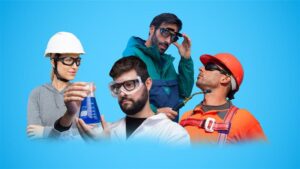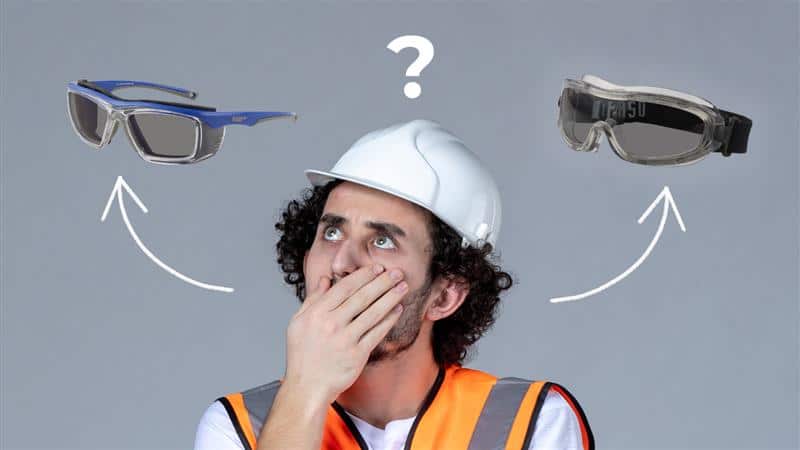One of the objectives in prevention is to ensure the protection of workers against the risks derived from their jobs. Speaking of eye risks and Personal Protective Equipment, we are talking about eye protection goggles.
First of all, it is essential to carry out a risk assessment of the workplace and to evaluate exposure. A good prior analysis will help to make a good choice of protective eyewear.
What eye risks should I protect against?
Risks of mechanical origin such as particle impacts, exposure to dust, fumes, shavings and liquid splashes will lead us to choose the frame based on its mechanical resistance or watertightness, which can cause trauma and erosion in the eye area.
Risks caused by physical agents, such as exposure to solar, ultraviolet, infrared, laser or ionizing radiation, will determine the choice of a frame based on its filtering action which may cause unwanted burns.
Risks due to chemical or biological agents, such as exposure to gases and dust particles, will lead us to choose watertight frames that protect the entire eye area from any foreign agent that could compromise visual health.
 Types of Safety Glasses
Types of Safety Glasses
If the eye protection is provided by two eyepieces coupled to a frame with temples, they are classified as universal safety spectacles. This type of spectacles can be customized and provide greater visual comfort in prolonged use.
If they have a single lens as eye protection and the frame in contact with the face protects the eye area in a watertight way, we are in front of the so-called integral protection glasses, which do not allow customized prescription, but in some cases they can be compatible with the user's usual refraction.
According to the study carried out by the CGCOO in 2019, the most used visual compensation system are glasses. It is compulsory, according to the LPRL, to carry out health surveillance of workers. How do you get the worker protected, with comfortable individual protection equipment and with their visual defect corrected? Graduating your workers.
How to choose the most suitable frame?
On the one hand, the risks to which the worker is exposed will be determined and the glasses will be chosen according to the level of safety. On the other hand, the worker must be provided with an optometric visit with a qualified specialist who will evaluate the needs of his or her job and assess the worker's visual health. In these specialized visits, the worker can specify the visual needs and demands inherent to their work activity (distant vision work, near vision work or both) and advise them on which lens is most appropriate for the activity they perform (progressive lenses, single vision, occupational, etc.).
The lenses for prescription safety spectacles are designed according to the latest technological advances and in compliance with all safety regulations, as well as the corresponding CE certifications.
Other considerations to take into account are the treatments that we can provide to the prescription lenses, such as anti-fogging treatment that allows clear vision and free of fogging, anti-reflective treatments, anti-scratch to give the lenses a long life in dusty environments, solar and solar polarized filters in outdoor work or photochromic that are regulated with sun exposure providing protection in both indoor and outdoor work.
Providing the worker with prescription protective eyewear is the right choice for users who need visual correction, wearing eye protection without underestimating comfort throughout their working day or in the face of work with prolonged exposure.
References:- Individual eye protection. Specifications, UNE-EN 166: 2002
- Safety spectacles with universal frame, FSU-EPI INSST
- Guideline for the selection and use of eye and face protectors, INSST
- White Paper on Vision 2019, CGCOO
- LPRL
